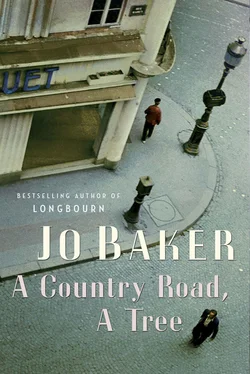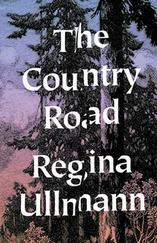“Well, that’s that,” she says.
He nods. That is indeed, as she says, that.
“You can’t go back now.”
He looks down at her face, the sharp angles, the lines of it. But he can’t stay. “I’ve told everyone I will be back.”
“Everyone?”
“All my friends.”
“Your friends.”
He nods.
She looks at him for a long moment, her throat in an uncomfortable twist. Those shady, disreputable people with their unimaginable lives, they are drawing him away from her. From security and comfort and a decent life.
“And what possible use,” she asks, “do you imagine you would be?”
CHAPTER TWO PARIS, Autumn 1939
It’s ridiculous to be happy now, Suzanne thinks. It’s outrageous. But she can’t help it.
She slips her arm through his. He shortens his stride for her, and this synchronization makes her smile. She breathes the warmth of tobacco and shaving soap and wine. Their footfalls clip across the Place Saint-Michel. The two of them are heading out in the hope that the cheap little café on the rue de la Huchette will have held its nerve and still be open, even though so many of the fancier bistros are battened down and shuttered now.
He didn’t have to come back. But here he is. Shoulder, throat, jaw and cheekbone, blue eyes following the passage of a car along the street. She leans in against him, and all is well.
In the morning, she slips out of his bed and into her clothes and out into the streets, threading through the bin men and the delivery boys and the market traders, back towards her own apartment and out of his way. There is a gauze of mist lying in the air and Paris is new again, and beautiful, after years of going almost unnoticed.
He has his work and it is important: she must not get under his feet. She has her own work to go to anyway, those fruitless hours with plump children in the bourgeois quartiers, plonking away on pianos that are far too good for them and of which she finds herself feeling jealous. She keeps her quiet hours alone in her own apartment too — she is finishing a new jacket, with little bone buttons, in anticipation of the colder weather to come. She goes to the market and she goes to the library; she takes herself off to see her friends. She keeps busy. She measures out her company carefully. A drop here, a drop there. She won’t make a nuisance of herself.
Whenever she goes to see him, she brings small comforts with her. A pastry to share, a bar of chocolate, some small item of needlework to soften the edges of his austerity. In the little kitchenette, there is usually only coffee and dust. She wants to make him comfortable. More comfortable than he can make himself.
The pale and wounded Irish man, his chest in bandages, strapped down by hospital sheets. She has been trying to make him comfortable ever since.
—
Nothing happens.
Late September days soften and cool and Paris is still lovely. The children walk in crocodiles in the street; confined for the day, their voices hang round school buildings in a haze: passers-by walk through clouds of rhyme and times tables, into billows of song.
There is a radio in the apartment next door; at the weekend, the thumping left-hand rhythm of popular songs, waves of laughter, jazz leak through the wall. The neighbour’s baby cries.
Someone comes to wrap the street lamps in blue paper; at night the cars go by half blinded with blackout strips. The rue de Vaugirard becomes a deep-blue river. It washes past his own backwater, the rue des Favorites. He closes the shutters, draws the blinds and lights a lamp, and pours just a drop of Jameson’s for himself, because it must be made to last. He settles into a book, or into his work, into the translation of Murphy into French.
Suzanne comes and goes. She twists her treacle-coloured hair back and stabs it with pins and throws him a brilliant smile. He’s always startled by that smile, as though a ball has dropped out of clear air and landed smack into his palm. The thing is, of course, to lob it back into play, but he’s often a fraction too late; she’s tidying away the newspapers, she’s heading to the kitchen, plumping up a cushion, she’s half gone already. But he knows she’s wanting something. It’s as though there is a cat around his ankles, silky and twining, but making him anticipate a stumble, expecting to do inadvertent harm.
He tries for her. He sets coffee warming on the gas ring, spreads rillettes on bread, fishes cornichons from the jar.
They eat in bed, their feet slipping together. She brushes shards of crust from the sheet. Her limbs are brown from the summer, her breasts and belly white where her swimming suit covered her; before he came to France he’d never seen a body patched like this, in a slow sepia exposure. Running a hand along her back, from tan to white to tan again, he feels grateful. She lifts her cup and sips her coffee. He turns away to hide his face. No point pinning this with words. Let it flutter by.
—
She goes with him to the Irish Legation, because his status here must be sorted out once and for all. And if you want to get something done, she says, ask a busy woman. She walks with him to the Place Vendôme through the drifting plane leaves, and she takes his arm. They pass the Opéra. It has gone dark. The building is shut up and locked tight, the windows shuttered, the gates wrapped in chains.
“Oh,” he says.
“We’ll go back,” she says, pulling him close, “when they reopen.”
“You think they’ll reopen?”
“Of course they will,” she says. “Eventually.”
Inside, the Legation is all polished wood and marble and dust-motes drifting in shafts of autumn sun. They join the back of a stationary queue. The Irish voices here, the conversations, tangle the air and make him breathless. He keeps his mouth shut, eyes down, to avoid the inevitable small-country connections, the friends of friends and cousins of cousins that there inevitably are in such places.
“I’m sorry, I — but you wish to remain?”
The clerk is a bluish-pale boy he has not dealt with before.
“Yes.”
“The two of you. Mr. and Mrs…”
“No.”
“But. Well.”
He watches the clerk’s expression, the questions that are not being asked. Why stay? What good will it do you staying here?
“We are processing exit permits right now…” The clerk looks at him a moment longer, then frowns down at the passport, picks through the pages; he purses his lips, peers up again. “Just let me, um.” He gets up unevenly from his desk, shuffles some documents together, tucks the passport in alongside them. “I won’t be a moment…”
And they’re left standing there at the desk together, in the light from high windows, with the smell of beeswax and tobacco smoke and with a parched, half-curled plane leaf at his foot that has tumbled in along with them. Her mouth twists up with impatience.
After a while, the clerk returns and hands the passport back. “He says you’ll need a certificate confirming your profession. That, along with your passport, should be sufficient for you to be granted leave to remain in Paris. Under the current dispensation.”
“How does he get one of these certificates?” Suzanne asks in her brittle English.
“By applying to us.”
She opens her lips. The clerk forestalls her: “We need a formal letter of application. With references.”
“How long will it take to process once you have the letter?”
“I can’t say. We have a good deal on our plates here at the moment.”
He nods, pockets his passport. “Right,” he says. Then, “Thank you.”
They turn away, and Suzanne tuts and shakes her head.
Читать дальше










